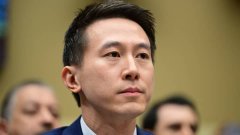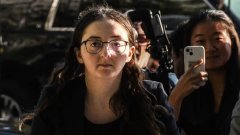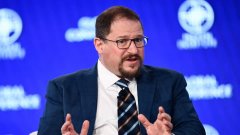
Caroline Ellison, the government's in its fraud case against FTX founder Sam Bankman-Fried, took the stand for cross-examination on Thursday morning as the trial continued in a courthouse in downtown Manhattan.
During a day of relatively slow proceedings, one of the more explosive encounters came in a side conference between the attorneys and Judge Lewis Kaplan, with the prosecutor claiming that Bankman-Fried's antics may be affecting Ellison.
Ellison was CEO of Bankman-Fried's hedge fund, Alameda Research, and also dated him on and off while working for him. She in December to two counts of wire fraud, two counts of conspiracy to commit wire fraud, conspiracy to commit commodities fraud, conspiracy to commit securities fraud and conspiracy to commit money laundering. Part of the 28-year-old's plea deal with the government has involved cooperating with the prosecution's case against Bankman-Fried.
On Thursday morning, Ellison faced aggressive questioning from Bankman-Fried's lawyer, Mark Cohen, who spoke over her several times as she tried to testify. But Judge Kaplan also appeared annoyed at the fact that Cohen requested two sidebars early on to pursue lines of questioning.
Ellison mostly avoided eye contact with the defendant, as she has during the past , staring down at her hands between questions and frequently flipping her hair over her left shoulder.
She did look towards Bankman-Fried when the lawyers were discussing legal matters at the bench. However, Bankman-Fried stared away, with hands clenched. After that glance, she made no eye contact.
During Cohen's cross-examination, Bankman-Fried was either facing forward with his hands clenched or typing on his laptop. He often looked stunned.
Part of the cross-examination revolved around Sam Trabucco, who was Alameda's co-CEO with Ellison from October 2021 until August 2022, months before both companies collapsed into as investors raced to withdraw funds from FTX, concerned about customer money being used to paper over losses at Alameda.
Ellison testified that she and Trabucco began handling a lot of Alameda's day-to-day business as early as 2020, well before officially taking over, and that there were periods of time where Bankman-Fried would not talk to them much.
By 2021, she testified, Bankman-Fried had largely stopped coming into the Alameda office and had left more of the job to Ellison. She said that Trabucco was good under pressure and at handling extreme trading situations.
She also testified that the firm had attempted to hire several people to oversee Alameda's accounting, but they all left. Ellison took on the role of preparing Alameda's balance sheets from Ryan Salame, who had been the CEO of a subsidiary called FTX Digital Markets. In previous testimony, Ellison admitted that she had used FTX customer money to pay Alameda's loans, and alleged she did so at Bankman-Fried's suggestion.
Ellison also testified that Bankman-Fried had discussed adding a new co-CEO when Trabucco left, but she resisted.
When Cohen asked if she considered herself an ambitious person, Ellison said she didn't think of herself as particularly ambitious, but became more so with Bankman-Fried's encouragement as she worked for him.
During late morning testimony, Cohen jumped around in his timeline and his questions were met with routine objections, a visibly annoyed Judge Kaplan, and requests by Ellison for the defense attorney to repeat what he said. The pace was so slow that some jurors appeared to be nodding off.
Ellison said she considered resigning from Alameda at various points from 2019 to November 2022.
On one of her Google Docs, Ellison had a section entitled "limiting factors in scaling," which she said referred to things that were keeping Alameda from doing well and making as much money as it could. The first the she listed was management.
"I feel like neither Trabaucco nor I has been doing a great job of pushing on stuff," she wrote. "We're in the mode of maintaining status quo and trying to fix problems."
Another topic in the Google Doc was "hedging" as a top priority. That referred to whether Alameda should go further in hedging its positions, such as selling crypto and buying Nasdaq futures. Ellison said she was skeptical and didn't do anything about it. Later that year, in September 2022, the firm did end up selling some and and put several billion dollars into Nasdaq futures, she said.
Regarding the comingling of operations between FTX and Alameda, Ellison admitted that the two firms didn't have a proper "Chinese wall" separating the businesses.
On the topic of her romantic relationship with Bankman-Fried, Ellison said their breakup in the spring of 2022 affected communications between the two of them. They would talk mostly over Signal despite living in the same apartment, and they largely avoided each other outside of work.
Another boyfriend entered the picture. On Nov. 16, several days after FTX declared bankruptcy and with Ellison now staying with her parents in the U.S., four or five FBI agents showed up to search the home. Ellison was there and, apparently, so was the house cleaner and her boyfriend.
The boyfriend was not named in court, but Ellison said he had worked at Alameda and FTX and that his laptop was confiscated during the search. Following the raid, Ellison met with prosecutors around 20 times, most recently on Monday to prepare for trial.
Bankman-Fried's fidgeting in the courtroom became an issue for the prosecution on Thursday.
Danielle Sassoon, the assistant U.S. attorney representing the government, told Judge Kaplan that several times "the defendant has laughed, visibly shaken his head, and scoffed," which she said could be having an effect on Ellison "given the history of this relationship, the prior attempts to intimidate her, the power dynamic, their romantic relationship."
Cohen responded by calling those claims "ridiculous" and said that any reactions from the defendant are "for your honor and the jury to decide." He said the government was "going out of its way to present highly cumulative evidence portraying our — my client as a very dirty person."
Kaplan said he wasn't going to make any public comments about the disagreement, but asked that Cohen "have a word" with Bankman-Fried, "and if he's doing anything, it should stop."
As part of his questioning late in the day, Cohen asked Ellison about trading app , and the almost Bankman-Fried purchased in May 2022.
The topic didn't elicit much from Ellison, though she said that Bankman-Fried renamed an entity Emergent Capital, which he controlled to hold the equity. Cohen said he'd come back to the issue, but he never did.
Cohen wrapped up cross-examination just before 2:30 p.m., and the prosecution then took about 15 minutes for follow-ups.
Ellison said she "felt trapped in the summer of 2022," because a revelation of FTX and Alameda's financial condition "would lead to a bank run" and both companies "would implode," she said.
Once the bank run had happened, Ellison said she felt more comfortable talking about it during an all-hands meeting on Nov. 6. Ellison said she didn't know about or authorize the $65.3 billion
that Alameda had with FTX.
Ellison said that during the summer and fall of 2022, she considered retiring. But after bringing it up with Bankman-Fried, he told her she was too important and he needed her to stay at Alameda. She said she trusted his opinion and didn't want FTX and Alameda to collapse so, on his suggestion, she stayed.
— CNBC's Dawn Giel and Kate Rooney contributed to this report
WATCH:




